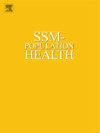无薪劳动对瑞典工作人口心理健康不良的影响
IF 3.1
2区 医学
Q1 PUBLIC, ENVIRONMENTAL & OCCUPATIONAL HEALTH
引用次数: 0
摘要
精神健康状况不佳使人衰弱,并引起全球公共卫生关注。无偿劳动被认为是心理健康的一个重要但被忽视的、高度性别化的决定因素。我们研究了无报酬劳动与其他已知风险因素在就业成年人中对不良心理健康的影响。研究数据来自5462名年龄在30-49岁之间的瑞典就业男女,他们对2022年的一项人口调查做出了回应。通过多元逻辑回归检验家务劳动(包括无偿家务和护理工作)与自我报告诊断的抑郁和焦虑之间的独立关联。研究还调查了经济困难、孤独、缺乏运动、饮酒风险和工作不满对抑郁和焦虑的影响。计算特定性别人口归因风险(PAR)以评估贡献。总的来说,10%的女性和6%的男性报告抑郁,分别有12%和6%的人报告焦虑。在女性中,有47% (95% CI: 31 - 57%) (PAR)的抑郁症患病率与家务负担有关,而在男性中没有发现独立的关联。孤独、经济困难和缺乏身体活动占女性和男性抑郁症患病率的13 - 28%。繁重的家务劳动在男女中都与焦虑有关,并解释了22 - 25%的患病率。虽然需要进行纵向研究,但这些结果表明,无偿劳动是造成心理健康状况不佳的一个非常重要的因素,尤其是对妇女而言。促进更平等地分配无偿劳动,有可能改善全体劳动人口的心理健康。本文章由计算机程序翻译,如有差异,请以英文原文为准。
The contribution of unpaid labour to poor mental health in the Swedish working population
Poor mental health is debilitating and of global public health concern. Unpaid labour has been recognised as an important yet neglected, and highly gendered, determinant of mental health. We examined the contribution of unpaid labour to poor mental health, in relation to other known risk factors, in employed adults. Study data is from 5462 employed Swedish women and men aged 30–49 years responding to a population survey in 2022. Independent associations between domestic work (inclusive of unpaid household and care work) and self-reported diagnosed depression and anxiety were examined by multiple logistic regression. The contributions of economic difficulties, loneliness, physical inactivity, risk consumption of alcohol and job dissatisfaction to depression and anxiety were also investigated. Gender-specific population attributable risks (PAR) were calculated to assess the contributions. In total, 10 % of the women and 6 % of the men reported depression while 12 % and 6 %, respectively, reported anxiety. Experiencing domestic work as burdensome explained 47 % (95 % CI: 31–57 %) (PAR) of the prevalence of depression in women, whereas no independent association was found in men. Loneliness, economic difficulties and physical inactivity accounted for 13–28 % of the prevalence of depression in both women and men. Burdensome domestic work was associated with anxiety in both genders and explained 22–25 % of the prevalence. Whilst longitudinal studies are needed, these results imply that unpaid labour is a highly important contributing factor to poor mental health, especially among women. Promoting a more equal division of unpaid labour has the potential to improve mental health across the working population.
求助全文
通过发布文献求助,成功后即可免费获取论文全文。
去求助
来源期刊

Ssm-Population Health
PUBLIC, ENVIRONMENTAL & OCCUPATIONAL HEALTH-
CiteScore
6.50
自引率
2.10%
发文量
298
审稿时长
101 days
期刊介绍:
SSM - Population Health. The new online only, open access, peer reviewed journal in all areas relating Social Science research to population health. SSM - Population Health shares the same Editors-in Chief and general approach to manuscripts as its sister journal, Social Science & Medicine. The journal takes a broad approach to the field especially welcoming interdisciplinary papers from across the Social Sciences and allied areas. SSM - Population Health offers an alternative outlet for work which might not be considered, or is classed as ''out of scope'' elsewhere, and prioritizes fast peer review and publication to the benefit of authors and readers. The journal welcomes all types of paper from traditional primary research articles, replication studies, short communications, methodological studies, instrument validation, opinion pieces, literature reviews, etc. SSM - Population Health also offers the opportunity to publish special issues or sections to reflect current interest and research in topical or developing areas. The journal fully supports authors wanting to present their research in an innovative fashion though the use of multimedia formats.
 求助内容:
求助内容: 应助结果提醒方式:
应助结果提醒方式:


